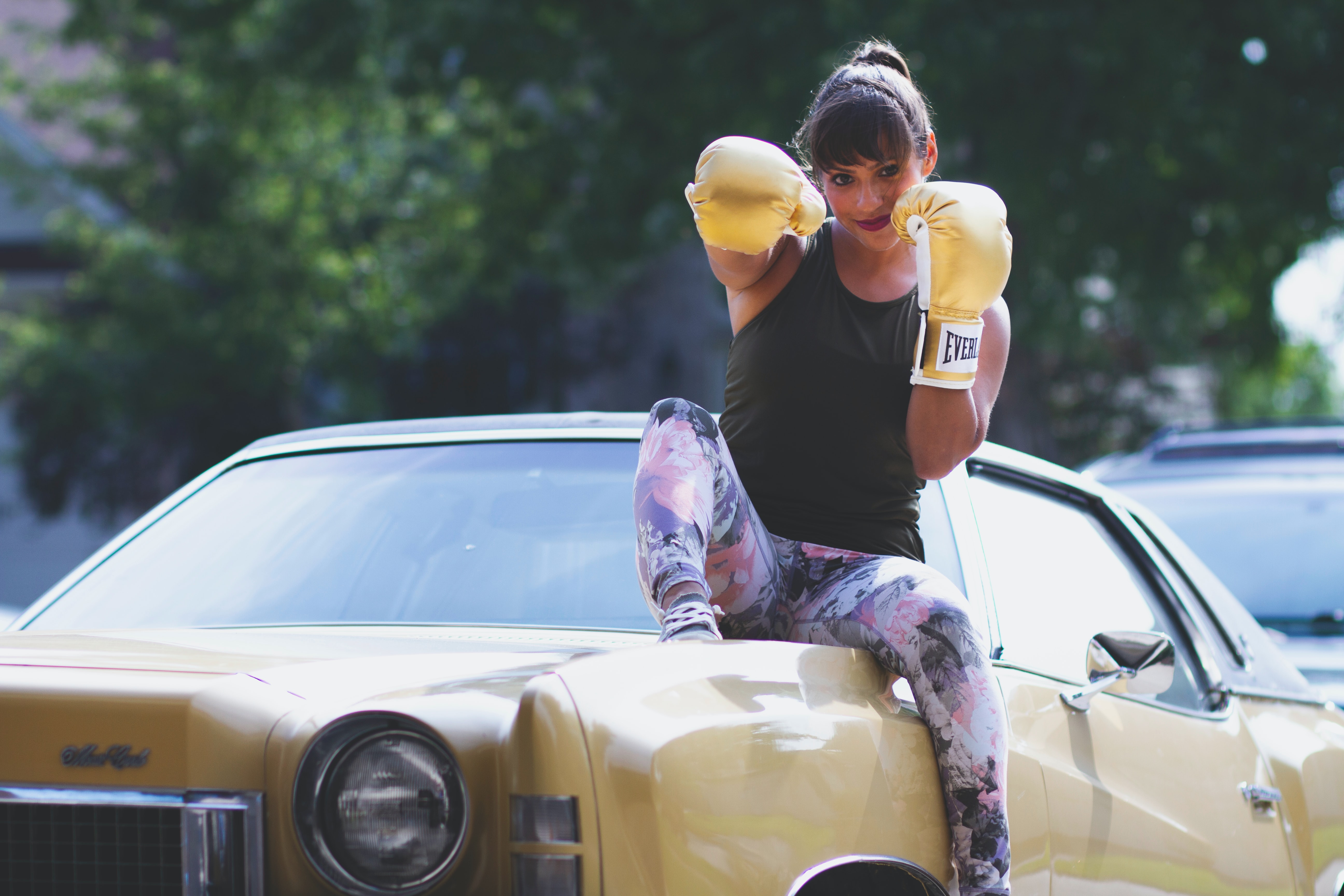The Case for Vulnerability

My fiancé’s wife is gesturing wildly for me to take my clothes off. We are huddled together in a bedroom off the main room of her traditional Moroccan home, and I can hear my AUP cohort on this study trip enjoying their pastilla in the nearby dining room. I don’t know the name of my sister-wife, but as I undress before her I see her sultry, full lips framing blinding veneers. They turn from grin to grimace as she takes in the tattoo on my ribs, unshaven underarms and utilitarian bra. Don’t worry, I thought. I’m also unimpressed. The sweat of my palms seeps into the white muslin veil I am to wear over my head during the “ceremony”. A swarthy little girl with big dark eyes peers into the room, and we share a nervous giggle. How do I always get myself into this shit?
When our host, the patriarch of this Moroccan family, approached me a few days prior to act as his betrothed in a mock marriage ceremony, I cringed. As a general rule for life, I like to play the role of voyeur, removed from the risks of participation and immune to hurt. But after nearly six years at a comfortable, corporate job, I was spiritually and emotionally stagnant. Both my mom and my manager had advised me to “fake it ‘till you make it”. So, after getting my bachelor's degree, I took a job at a corporation where I faked it every day. I was so invested in this mantra that I faked it every single day for five years. And every day of those five years I retreated a little further into myself, relying more and more on the chilly façade I had created to get by. Nobody, including myself, could access the real me. I would have moments where my authentic self would burst through, surprising my colleagues but mostly myself, now an expert at building and maintaining a front to survive. The insular world I had created for myself was very safe, comfortable and cold. It felt like I was slowly freezing to death from spiritual inertia. Choosing to leave the country and go to grad school was a subconscious attempt to break through my façade.
“Fake it ‘till you make it” is terrible advice according to Laura Huang, a professor at Harvard Business School. It can help you in the short term to get through a job interview or nail a presentation, but what happens after time has passed and you are “making it” on an inauthentic version of yourself? Four weeks into grad school, I could feel my façade begin to crack. Until that point, I completed every reading before class, turned in my assignments on time, and made sure my hand went up first anytime a professor asked a question. If you saw me, I’d probably grin at you with a thousand-watt-smile through bright crimson lips. I’d give a coquettish little wave, ask how your day was going, and practically screech, “Do you want to do coffee sometime this week?” The enthusiastic, cheerful, fragile façade I had cultivated was beginning to falter. My frantic insides did not match what I was presenting to the world, and it was only a matter of time before I couldn’t fake it anymore.
One Sunday, I was getting ready to meet a friend for brunch. I spent a rare morning of calm scrolling through Instagram, sipping coffee and feeling very much like the cat who got the cream. I had escaped a 9-5, a series of failed relationships and reinvented myself in Paris. I started on my second layer of mascara when the noise of the bathroom fan was slowly replaced with a high-pitch ringing in my ears. My eyes, once two, were now four, dazed and glassy. Sweat beads gathered above my lip, between my thighs, and I tried to grip the edge of the sink with my slick palm. It felt like someone was pouring cold, fizzy ginger ale onto my brain and I finally blacked out. When I came to, lying on the bathroom floor, I realized I had been faking it for too long.
Being raised in New England and coming from a corporate environment where vulnerability could be seen as a liability had conditioned me to hide my faults, but my professors received me with open hearts and minds. The hardest part was letting my walls come down. It was uncomfortable, clumsy, and embarrassing. After letting them in, I made an appointment with the school counselor, who was able to get me in touch with my current therapist. I got extensions on my assignments, which bought me some time to get my bearings. My world felt like it was opening up. My dear advisor, AUP Professor Hannah Westley, reminded me that I am not only here to get a degree, but to enjoy myself. I think we forget as students that there is as much value in the process of getting our degree as the benefits of the degree itself.
I was humbled but emboldened by this experience, and wanted to explore the journey of vulnerability as a grad student. I spoke with Geoff Gilbert, Professor of Comparative Literature and English at AUP. He defines vulnerability as “the capacity to be wounded” against what he calls our “fantasy intactness”, or our façade. We connected because I, like him, had to learn to thrive in environments to which we were not native. Gilbert came from a working class background at Cambridge, and I was a townie growing up in Greenwich, Connecticut, one of the most affluent communities in the United States. We both consider this formative to our development. His vulnerability within this rigid system allowed him to study questions of class objectively, and to choose a life path. He explains that it would have been easier for him to try and succeed on “their” terms, but it would have been less interesting.
I wanted to know his views on being an emotionally vulnerable student in an academic environment. He explains that the emotionally vulnerable student will inevitably work at a slower pace, as they are learning while trying to integrate past experiences into the self. He also notes that vulnerability intersects with questions of gender, sexuality, and class. I recognize that I have an enormous amount of privilege as a cis-gender, white woman asking for help at a university where most students and faculty look like me. Professor Gilbert agrees, and laments the unfair barriers students of color or female students face in asking for help from older, white (often male) authority figures. Vulnerability in any sense is a dangerous business, as there will always be those who seek to exploit it. These students, he says, may not have the luxury to be vulnerable. The key, according to Gilbert, is to strike a balance between understanding that not every conversation in an academic setting will be an opportunity to explore the wounds that have penetrated the fantasy intactness, but avoiding those opportunities that do “becomes a routine of work that stops interesting thinking”. Interestingly, Gilbert notes that the majority of students with whom he can connect on an intellectual level have needed counseling at some point in their studies. His ideal student is a vulnerable one, he says. One who asks questions, who has not hardened against the world, and one who takes the risk of moving towards academically dangerous, unfamiliar places in the name of growth and resilience.
Gilbert’s views on vulnerability jive with those of Julia Boorstin, author of When Women Lead, a case study of 60 female leaders and the strategies for success they share. According to an article for Fortune Magazine, CEOs who express uncertainty during times of crisis negatively affect their companies' stock value. Boorstin points out, however, that showing vulnerability in leadership at key moments can be an incredible way to earn trust from your team, source helpful feedback, and gather valuable information from unlikely places. Case in point is Katrina Lake, founder and former CEO of Stitch Fix. Lake had a great idea to form a clothing subscription service, but didn’t know how to get it off the ground. She laid bare her lack of expertise and, inspired by her candor, poached the COO of Walmart and the VP of algorithms from Netflix. Stitch Fix is now a multi-million dollar company and makes Forbes’ 2022 lists of America’s Best Employers By State and Best Employers for Women. The case study is a testament to the power and quantifiable results of sharing a simple emotion with key allies.
Although I do not recommend volunteering yourself to the patriarch of a Moroccan family (I’m still not sure if I’m technically married), I can sincerely say I grew from the experience of laying bare my vulnerability to my professors, counselors and colleagues at AUP. In doing so, I was able to deepen my relationship with my advisor, uncover resources to make my journey more enjoyable, and to build resilience, a trait cited by executives as a key factor to success. My conversations with my advisor are more intimate, and I know I can go to her with any concern. My professors appreciate the open lines of communication, and I was able to learn about them as people. It’s easier to accept a stressful class or tough interaction as a temporary setback within the larger context of enjoying my journey at grad school in the most beautiful city in the world. In short, I am able to see the full forest, not just the trees. I encourage any student to take down their armor and do the same.








